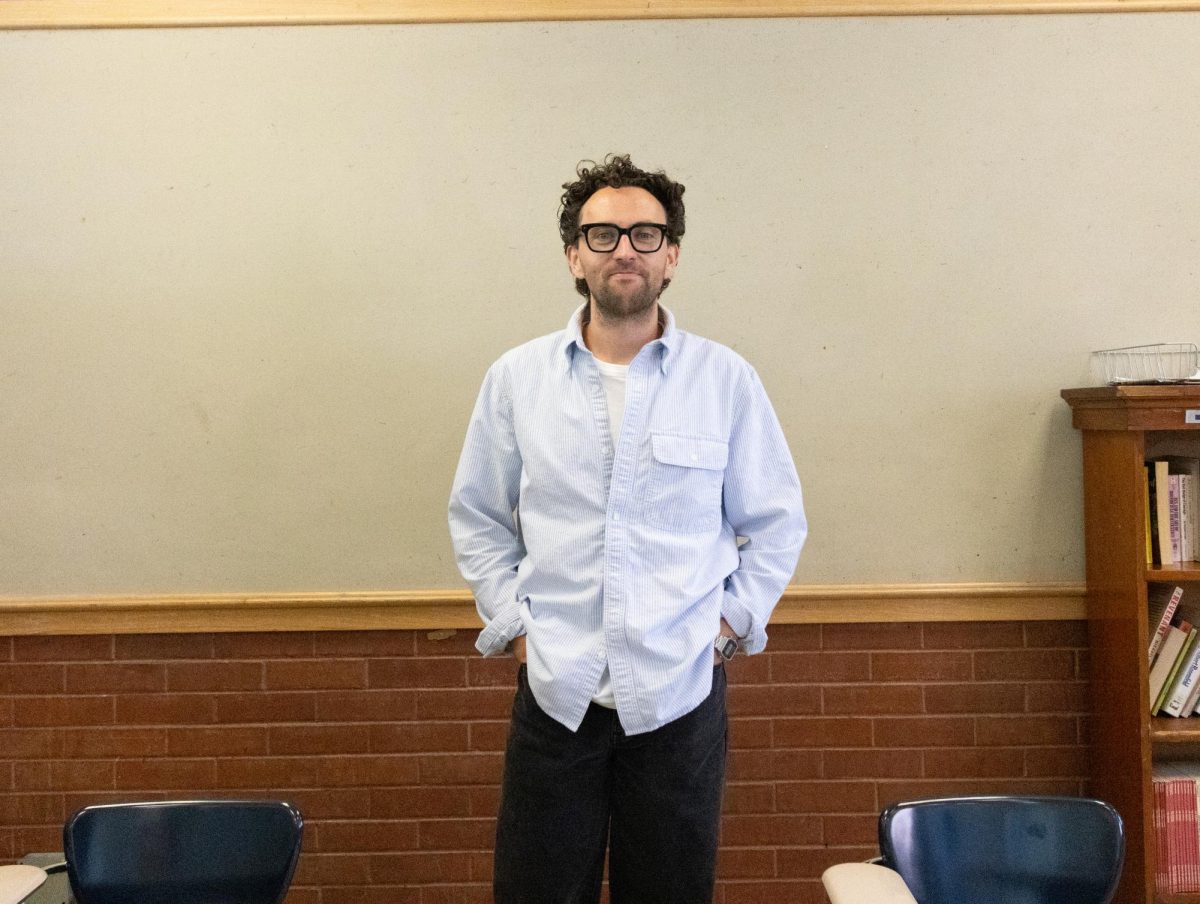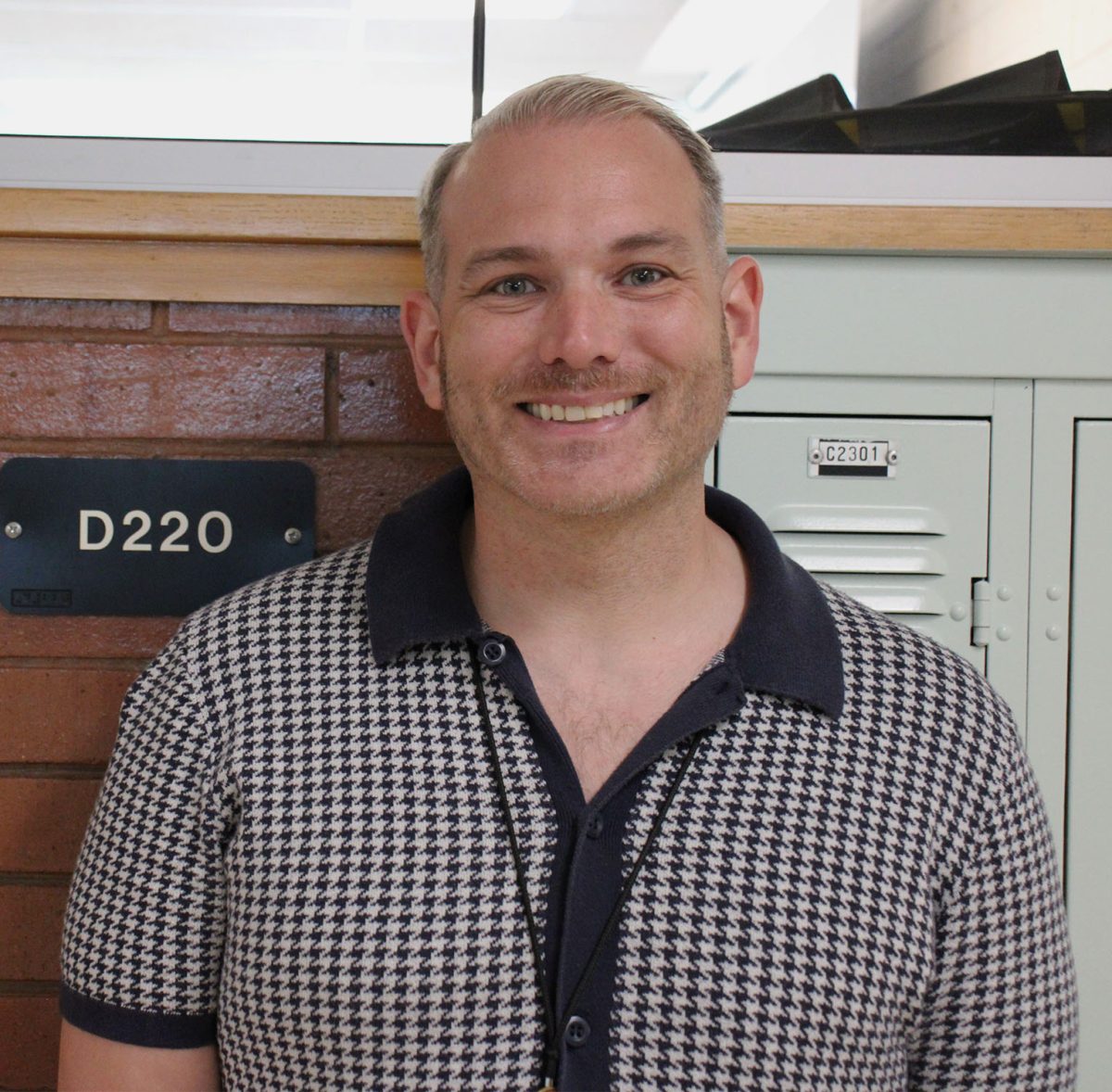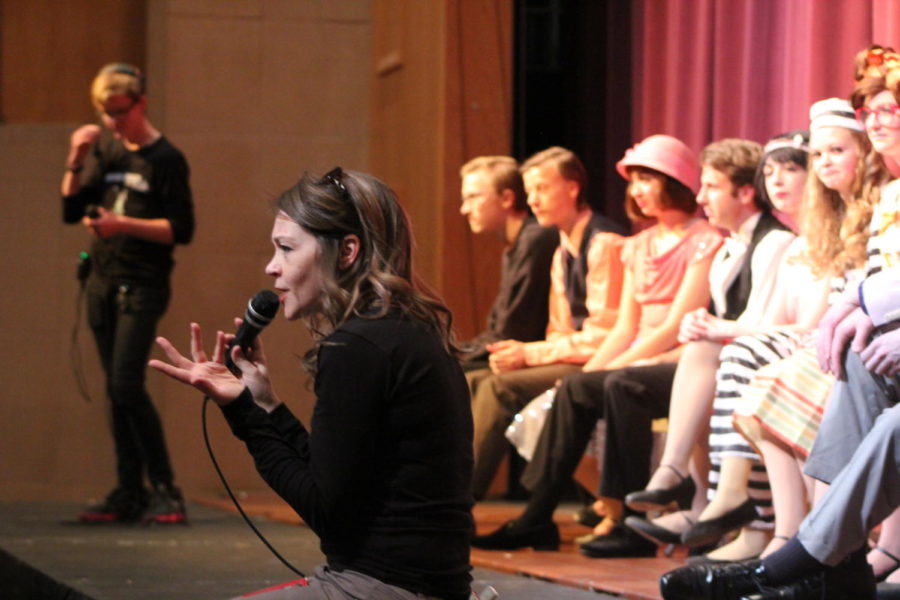Questions and Concerns: Highland Hosts Talkback After Matinee Performance
Director Alexie Baugh addresses the audience at the talkback.
December 2, 2019
As the curtains came to a close and the actors did their final bows, the audience gave them a standing ovation. On November 12th, Highland brought their production of Thoroughly Modern Millie to a close.
Millie had 5 showings, with both a matinee and night performance on Saturday, November 9th. After the matinee performance, another event was added to the program. Those involved with the production of the musical hosted a talkback, where the floor was opened up to audience members to ask questions regarding anything Thoroughly Modern Millie.
The idea belonged to Riley Hackford-Peer, the actor who played Bun Fu.
“There was a lot of backlash when we said we were going to do the show because of the racial things and things like that, and we have always had the best intentions, Hackford-Peer said.
The talkback opened up with a question regarding how long the production was in rehearsal, which was answered by Amelia Shelby, the actress who played Miss Flannery.
“I believe it was only 2 and a half months, it was not very long,” Shelby said. “We got cast and then started rehearsal processes and here we are, two and a half months later.”
Throughout those two and a half months, the cast of Millie tackled a lot of different obstacles. The second question revolved around Hackford-Peer and Charlie Beren’s characters, Bun Fu and Ching Ho. The brothers, along with Mrs. Meers, were a hot topic once the production was revealed to the school, as their lines were entirely in Mandarin and Cantonese until the end of the show. The question delved into one of the most difficult aspects of their character, language.
As Shelby previously stated, rehearsal lasted for around two and a half months, which is also the time that Hackford-Peers and Berens spent learning their characters’ lines.
“We’ve been constantly memorizing this whole time. We sat down for a couple hours with Xiao Yu Belnap who taught us Mandarin and was super helpful,” Berens said. “Then one day with Rod, he taught us the Cantonese.”
Xiao Yu Belnap and Rod Tate were the language coaches who worked with Berens and Hackford-Peer to ensure that they were accurately presenting their target language.
“It was a lot of using the voice memos app on our phones of recordings and then us trying to say it and then trying to say it with them, and that’s really hard,” Hackford-Peer said. “We worked really hard and we felt like we owed it to these roles because they are really important.”
Rebekah Lingen, the actress who played Mrs. Meers, added a story about rehearsing Not For the Life of Me (Reprise 2), and the issue with the lyric Jia you! The actors tell of the difficulties dealing with the different tones in the Cantonese and Mandarin languages, and how challenging they were to get right. During rehearsals, this was a practice point frequently visited.
“It look so long to get it correct, and we practiced over and over,” Lingen said.
When one audience member asked if learning another language or tap dancing was harder, Hackford-Peer had a clear answer.
“Learning another language!” he exclaimed, earning a laugh from the audience. “It’s so much harder to speak in a different language because not only do you have to know exactly what you’re saying so it comes across to the audience, but also the normal things that we do acting wise, you have to find the middle ground, and it’s really hard.”
The topic then shifted towards the performance aspect of the production, as an audience member inquired about tap dancing. Luke Allen, who played Ira/Kenneth, along with Sofia Kenrick, who played Ruth, covered this question.
“So we actually hired a tap choreographer to help us with our two tap numbers, like The Speed Test. There was a lot of rehearsing and a lot of tap dancing down in the dance room so that we could see each other in the mirrors,” Allen said. “It was a lot of work.”
The initial learning of tap dance didn’t start after the cast list when out, however. Summer rehearsals were held in order to be ready to learn the dances when the production first started. Kenrick talks about their experience through this process.
“It was kind of scary to learn tap because it moves so fast, and it’s so small. Learning with the choreographer over the summer, it was a lot of ‘you’re doing it wrong’ and we didn’t know why,” Kenrick said. “‘You’re not flicking your ankle right,’ like how do you flick your ankle right? It was a lot of hard work, and a lot of sweat. Like a lot of sweat.”
The next question focused on Mrs. Meers, and the direction that Lingen took with her character. A seasoned Millie attendant, who had seen this production multiple times, inquired about how she came to her specific interpretation of the role.
“When I first got the role I was really nervous because I didn’t want to be insensitive to anybody,” Lingen said. “Usually, she is played as a person pretending to be Chinese, and we were really nervous about that because we didn’t want to offend anybody.”
Lingen explained that it was her uncle that approached her with the idea of portraying Mrs. Meers as an elderly woman, rather than the original script where she feigns being Chinese.
“We decided that that would play really well, and we really tried to play up her trying to be this actress that she’s always wanted to be. I think that really helped us to move away from the [fear] of being insensitive and racist and rather having fun with the role that is actually really fun.”
Lingen’s character was one of the largest points of alarm once the musical was announced. In the past, Mrs. Meers, along with brothers Bun Fu and Ching Ho, have been portrayed in ways that are very insensitive and racist. The Highland community was very concerned as to how the theater department was going to put these characters on stage.
“It’s been a journey to find Mrs. Meers,” Lingen said. “The point is that she’s rude to other people, and I was trying to channel that but also be sensitive.”
Baugh also spoke on her experience working with Lingen and the process of putting these characters on stage.
“Rebekah’s great because when we casted her I told her, ‘I don’t know where to go with this.’ Completely,” Baugh said. “People kept asking me, ‘Where is the line?’ And I guess where I finally come to is that I don’t think there is one in art. I think for every single instance and every single show that line is going to be different based on your cast, based on your audience, based on the year you present it, and that was really hard for me because I kept trying to define a line when I really don’t think there is one.”
The rehearsal process with Mrs. Meers and Bun Fu and Ching Ho was an organic one. As Baugh explained, it was a long process of tweaking, re-doing, and finding a place where everyone felt comfortable.
Comedy was a prominent factor of the musical. The next couple questions surrounded the actors’ takes on comedic timing and physicality within their rolls.
“Part of it was that it was really fun to play off of Bun Fu and Ching Ho. They had a lot of really good ideas, and so did [Baugh]. I think that’s where a lot of the humor came in, and it was really fun to interact with the audience,” Lingen said.
Amelia Shelby, who played Miss Flannery, had an easy time conveying her character.
“I think for my character, it was easy to be comedic because I felt my personality in the character, and so I could unleash that wild person that I am, and that came out on stage.”
Woes and hardships also struck other parts of the production. Stage crew had to design and create the entire set by scratch, the pit’s music was three weeks late, and the chorus had to tackle three-part harmonies. While the production had its ups and downs, it seemed to be an overall success. Vocal director Katie Houston says this:
“I have been blown away with what they were able to do.”





























